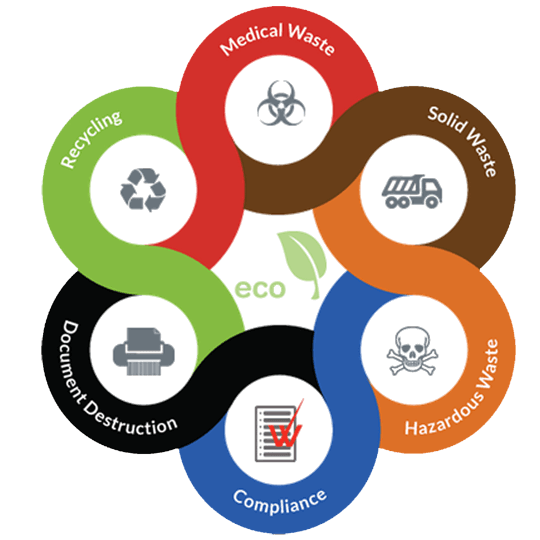Liable Solutions: Comprehending Medical Garbage Disposal Provider
In the world of healthcare, the appropriate disposal of medical waste is an important facet that demands mindful factor to consider. The relevance of taking care of clinical waste responsibly exceeds mere compliance with laws; it directly influences public health and wellness and ecological safety. As healthcare centers produce various kinds of waste that call for specialized handling, understanding the nuances of clinical garbage disposal services is paramount. By exploring the intricacies of this important process, we can clarify the most effective techniques, advantages of specialist solutions, and sustainable solutions readily available.
Relevance of Appropriate Clinical Garbage Disposal
Proper medical waste disposal is crucial in maintaining a safe and sanitary setting within medical care centers. In healthcare setups, numerous kinds of waste are generated daily, including transmittable materials, sharps, ended medicines, and chemical materials.

Kinds Of Clinical Waste
Within medical care centers, a diverse range of waste materials categorized as medical waste is generated, each calling for specific handling and disposal techniques. Pathological waste, which consists of cells, body organs, and body components, necessitates proper disposal to appreciate the dignity of the dead and prevent any biohazards. Understanding the different kinds of medical waste is vital for medical care centers to carry out reliable waste administration approaches and protect public health and wellness and the setting.
Regulations and Compliance
Healthcare centers have to abide by rigorous laws regarding the handling and disposal of clinical waste to guarantee compliance with legal requirements and protect public wellness. These guidelines are established to avoid the spread of infections, shield the environment, and maintain the safety and security of health care employees and the public. Different regulative bodies, such as the Epa (EPA), the Occupational Safety and Health And Wellness Management (OSHA), and the Department of Transportation (DOT), have details standards that healthcare centers must adhere to.
To conform with these policies, medical care facilities should effectively segregate, shop, transportation, and deal with different kinds of clinical waste. This consists of sharps waste, transmittable waste, contaminated materials, and pharmaceutical waste, each calling for details dealing with treatments. Facilities must likewise maintain exact records of waste generation and disposal to demonstrate conformity throughout inspections.
Non-compliance with medical waste policies can lead to extreme charges, fines, and damages to the center's track record. Therefore, it is vital for healthcare centers to remain educated about the most up to date policies and carry out robust compliance steps to protect public health and the atmosphere.
Benefits of Professional Disposal Services
Engaging professional medical garbage disposal solutions supplies medical care centers a effective and dependable option for taking care of hazardous products. By outsourcing this critical job to experts, health care centers can ensure conformity with policies while concentrating on giving top quality treatment to patients. One of the crucial advantages of specialist disposal services is the experience they offer the table. These solutions employ skilled experts who are fluent in taking care of different sorts of clinical waste, making sure appropriate partition, packaging, disposal, and transport.
Additionally, professional disposal services make use of advanced tools and follow industry finest practices to reduce ecological he said effect and lower the risk of contamination. This not just promotes a safer workplace for health care staff but additionally contributes to total public wellness and security. Additionally, contracting out clinical garbage disposal can result in set you back savings over time by getting rid of the demand for in-house monitoring and disposal systems.
Lasting Practices in Healthcare

One trick lasting method in health care is waste reduction. By applying techniques to reduce unnecessary product packaging, single-use items, and general waste generation, healthcare facilities can substantially decrease the amount of waste sent to garbage dumps or incineration. Additionally, recycling programs for products like plastic, paper, and glass can further minimize the ecological impact of medical care procedures.

Verdict
In conclusion, correct my latest blog post medical garbage disposal is crucial in maintaining a healthy and balanced and safe environment for both healthcare workers and the basic public. Comprehending the various sorts of clinical waste, complying with laws and conformity criteria, and utilizing professional disposal solutions are vital action in responsible waste monitoring. By embracing sustainable techniques in healthcare facilities, we can lower ecological effect and make sure the wellness of all people associated with the health care market.
As medical care centers produce various kinds of waste that need specific handling, comprehending the subtleties of clinical waste disposal solutions is vital.Within healthcare centers, a index diverse array of waste products categorized as clinical waste is created, each requiring specific handling and disposal methods. Understanding the numerous types of medical waste is essential for healthcare centers to execute efficient waste administration methods and safeguard public wellness and the setting.
By implementing strategies to minimize unnecessary packaging, single-use things, and general waste generation, health care centers can considerably decrease the quantity of waste sent out to land fills or incineration. Comprehending the various kinds of medical waste, adhering to laws and compliance standards, and utilizing professional disposal services are crucial actions in accountable waste administration.